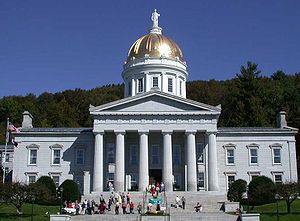By DAVE GRAM
The Associated Press

- Image via Wikipedia
EAST MONTPELIER, Vt. — Marlene and Mike McCarty, real estate brokers who do much of their work at home less than four miles from the Vermont Statehouse, say they spend hundreds of dollars and hours each month on things they wouldn’t have to if they had broadband Internet access.
Despite promises for years by state officials and phone and cable companies that they would have broadband by 2010, they’re still waiting. Now Vermont is in the heat of a gubernatorial campaign, and the candidates are making a new round of promises about broadband and fixing Vermont’s spotty cellular phone coverage.





 RALEIGH, NC – North Carolina legislators recently killed a proposed bill by state Senator David Hoyle (D-Gaston) that would have put a moratorium on municipal broadband efforts, but the issue is likely to arise again in January, say community activists in favor of continuing to allow cities to build their own broadband networks.
RALEIGH, NC – North Carolina legislators recently killed a proposed bill by state Senator David Hoyle (D-Gaston) that would have put a moratorium on municipal broadband efforts, but the issue is likely to arise again in January, say community activists in favor of continuing to allow cities to build their own broadband networks.